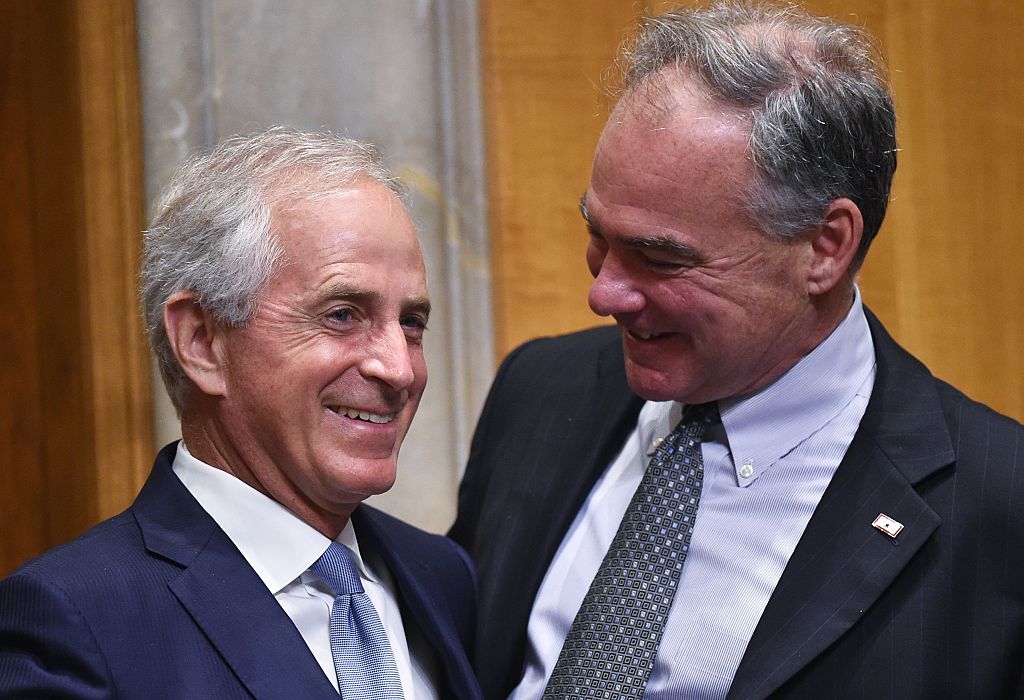Senators unveil bipartisan bill to repeal and replace 2001 and 2002 authorizations for use of military force


A free daily email with the biggest news stories of the day – and the best features from TheWeek.com
You are now subscribed
Your newsletter sign-up was successful
On Monday, Senate Foreign Relations Committee Chairman Bob Corker (R-Tenn.) and Sen. Tim Kaine (D-Va.) introduced legislation to replace the 2001 and 2002 authorizations for use of military force (AUMF) that Presidents George W. Bush, Barack Obama, and Trump have used to wage military campaigns in Afghanistan, Iraq, Libya, Syria, Yemen, and elsewhere. The new AUMF would allow the president "to use all necessary and appropriate force against al-Qaeda, the Taliban, the Islamic State in Iraq and Syria (ISIS), and designated associated forces," but it requires the White House to notify Congress about any military action undertaken using this authorization within 48 hours. Congress has 60 days to object or tacitly sign off on the use of force.
There is mounting support in Congress to revisit the aging war-powers authorizations, as more moderate lawmakers join liberals and libertarians in their concern over what three presidents have largely taken as carte blanche for military action. Sen. Jeff Flake (R-Ariz.), a cosponsor of the legislation, points out that only 22 senators and fewer than 150 House members were in Congress when it approved the 2001 AUMF.
But this Corker-Kaine proposal, which is scheduled to get a committee vote next week, has tepid support from GOP leaders, and it isn't clear it has the votes to move forward. The new AUMF, billed as a compromise, faces criticism because it doesn't automatically expire, instead giving Congress a chance to review the authorization every four years. "For too long, Congress has given presidents a blank check to wage war," Kaine said in a statement. "Our proposal finally repeals those authorizations and makes Congress do its job by weighing in on where, when, and with who we are at war." Corker said it gives president "the flexibility to be successful that they now have, but it also keeps Congress in the loop in having the ability to stop it."
The Week
Escape your echo chamber. Get the facts behind the news, plus analysis from multiple perspectives.

Sign up for The Week's Free Newsletters
From our morning news briefing to a weekly Good News Newsletter, get the best of The Week delivered directly to your inbox.
From our morning news briefing to a weekly Good News Newsletter, get the best of The Week delivered directly to your inbox.
A free daily email with the biggest news stories of the day – and the best features from TheWeek.com
Peter has worked as a news and culture writer and editor at The Week since the site's launch in 2008. He covers politics, world affairs, religion and cultural currents. His journalism career began as a copy editor at a financial newswire and has included editorial positions at The New York Times Magazine, Facts on File, and Oregon State University.
-
 What is the endgame in the DHS shutdown?
What is the endgame in the DHS shutdown?Today’s Big Question Democrats want to rein in ICE’s immigration crackdown
-
 ‘Poor time management isn’t just an inconvenience’
‘Poor time management isn’t just an inconvenience’Instant Opinion Opinion, comment and editorials of the day
-
 Bad Bunny’s Super Bowl: A win for unity
Bad Bunny’s Super Bowl: A win for unityFeature The global superstar's halftime show was a celebration for everyone to enjoy
-
 British warship repels 'largest Houthi attack to date' in the Red Sea
British warship repels 'largest Houthi attack to date' in the Red SeaSpeed read Western allies warn of military response to Iranian-backed Yemeni rebels if attacks on ships continue
-
 Houthi rebels claim Red Sea ship attacks
Houthi rebels claim Red Sea ship attacksspeed read Iran-backed Yemeni group vows to escalate aggression towards Israel-linked vessels in revenge for Gaza war
-
 Israel plans next phase of Gaza war as first hostages released
Israel plans next phase of Gaza war as first hostages releasedSpeed read After four-day ceasefire 'we will not stop' until destruction of Hamas, says Israel
-
 Mob storms Russian airport 'looking for Jews'
Mob storms Russian airport 'looking for Jews'Speed Read Plane from Israel surrounded by rioters chanting antisemitic slogans after landing in Russia's Dagestan region
-
 Tuberville's military promotions block is upending lives, combat readiness, 3 military branch chiefs say
Tuberville's military promotions block is upending lives, combat readiness, 3 military branch chiefs saySpeed Read
-
 Ukraine's counteroffensive is making incremental gains. Does it matter in the broader war?
Ukraine's counteroffensive is making incremental gains. Does it matter in the broader war?Speed Read
-
 US commissions first-ever Navy ship in a foreign port
US commissions first-ever Navy ship in a foreign portSpeed Read
-
 British spy chief, Wagner video suggest Prigozhin is alive and freely 'floating around'
British spy chief, Wagner video suggest Prigozhin is alive and freely 'floating around'Speed Read
